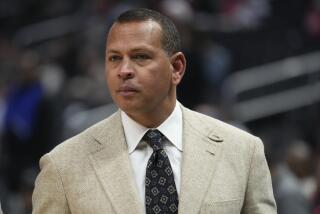Samples in BALCO Case Used in Deal With White
- Share via
When anti-doping authorities confronted top U.S. sprinter Kelli White about steroid abuse, they had test results to support their accusations. But those results did not come from tests administered at any track meet. Instead, her lawyer said Thursday, they came from the man who allegedly supplied the drugs.
This evidence helped persuade White to accept a two-year suspension this week. Not only did she forfeit the medals she had won since late 2000, she could lose hundreds of thousands of dollars in earnings.
Details of the deal she struck with the U.S. Anti-Doping Agency came to light Thursday in interviews with her lawyer, Jerrold D. Colton, and sources close to the case.
Some in the sports world have wondered why she accepted the ban, but Colton said his 27-year-old client had little chance of remaining eligible for the Olympic Games this summer and faced a four-year or even a lifetime ban had she chosen to fight.
“With all that,” Colton said, “it seemed like the right decision.”
White’s problems began when federal agents raided the Bay Area Laboratory Co-Operative, or BALCO, in September.
BALCO owner Victor Conte and three other men were subsequently charged with distributing performance-enhancing drugs to dozens of professional baseball and football players and Olympic athletes. The four defendants have pleaded not guilty.
Records indicating that Conte had sent blood or urine samples to another lab, Quest Diagnostics, were among the evidence gathered by federal agents, according to a search warrant affidavit.
Prosecutors allege that Conte promised to help athletes use performance-enhancing drugs without detection. They suspect Conte sent out the samples to be sure his “athlete clients” would not get caught.
But at least some of the results came back positive. The San Francisco Chronicle reported Thursday that these private test results, once confiscated, were among federal evidence subpoenaed by a Senate committee and handed over to USADA.
In recent weeks, White met with USADA officials at a hotel and a law office in San Francisco. There, she learned the extent of the evidence against her.
“There was some data that showed actual tests,” Colton said.
Given that the samples were submitted by Conte, and not White, this evidence might never have made it into a courtroom trial.
But athletes who compete in national meets agree to have their doping cases handled through USADA’s system of hearings and arbitration.
“The way USADA works, you’d better believe [the samples] would have gotten in,” Colton said.
The agency announced White’s ban Wednesday. White has expressed regret for her actions and has agreed to help authorities pursue other cheaters.
More to Read
Go beyond the scoreboard
Get the latest on L.A.'s teams in the daily Sports Report newsletter.
You may occasionally receive promotional content from the Los Angeles Times.







